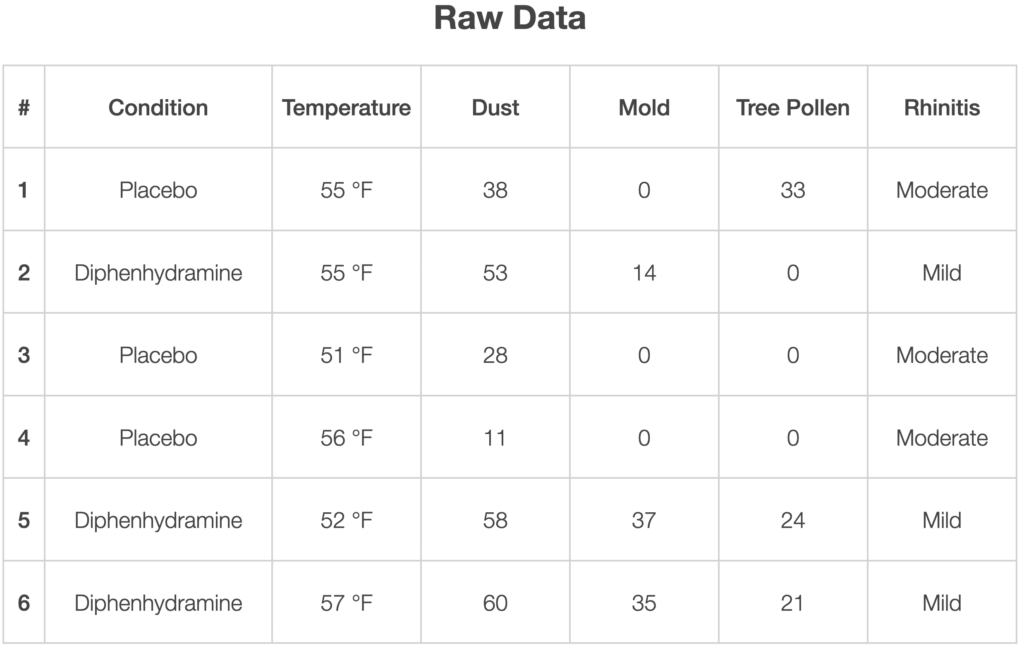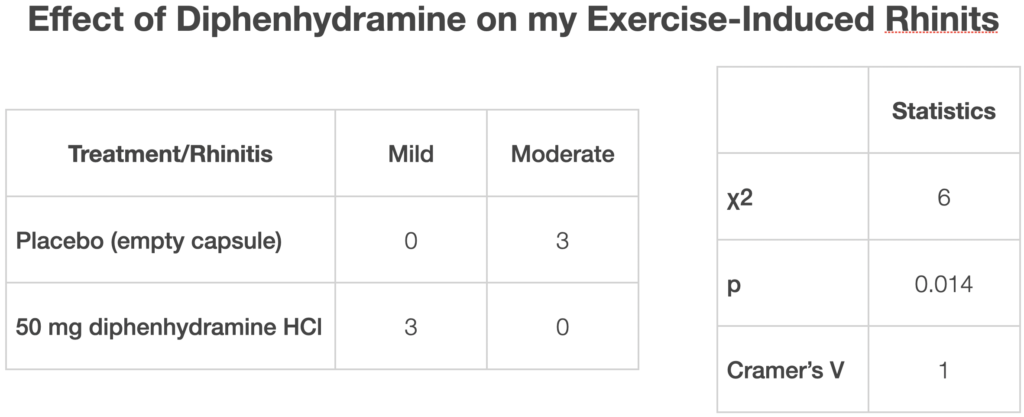Get new posts by email or rss feed
In a previous post, I mentioned that I get a runny nose when I go for a walk in the mornings or a run in the evening. It’s not terrible, but is annoying and prevents me from breathing comfortably through my nose. I hypothesized that this was caused by allergies and, with great feedback from readers (Reddit, QS forum), designed a set of experiments to check whether this was the case.
In this post, I will report the results from the first experiments, a blinded, placebo-controlled test of exercising after taking a fast-acting antihistamine.
TL;DR:
- Fast-acting antihistamine reduced my rhinitis, but that could be due to preventing a mild allergy or just drying out my nasal passages.
- All other allergy medication I can find also reduces mucus production and the other intervention I was planning (wearing an N95 mask) blocks allergens, but will also increase the temperature of the air I breathe and thus not distinguish between allergy and cold as the cause.
Does anyone know of a test a way to block/prevent allergies that doesn’t dry out nasal passages or increase the temperature of the air you breath?
– QD
Details
Purpose
- To determine the cause of my exercise-induced rhinitis.
Background
I’ve started paying more attention to my breathing in the past few weeks and have noticed that when I go for a walk in the mornings or a run in the evening, I develop a runny nose that goes away shortly after I go back inside. It’s not terrible, but is annoying and prevents me from breathing comfortably through my nose.
From a quick search, my symptoms match closely with exercise induced rhinitis (list of articles). Numerous studies have found that exercise-induced rhinitis is usually caused by allergies. I have never had nasal allergies, but it’s possible I’ve developed them or that they’ve always been mild enough that I haven’t noticed.
I’d like to determine whether my symptoms are, in fact, being caused by allergies and, if so, if there’s any simple interventions I can do to mitigate them.
Results & Discussion
Exploratory Assessments
To narrow down the possible causes of my exercise-induced rhinitis, I did a few quick exploratory experiments:
Experiment 1: Is the effect consistent?
- Experiment:
- For 3 weeks, I recorded the severity of my rhinitis at the end of my morning walk.
- Result:
- 20/21 days: moderate rhinitis (nasal fluid, restriction in breathing, but can still breath through nose)
- 1/14 days: severe rhinitis (nasal fluid, cannot easily breath through my nose)
- Conclusion:
- My rhinitis is very consistent and doesn’t significantly fluctuate based on typical day-to-day changes in weather or allergen level in my area.
Experiment 2: Does my rhinitis occur without exercise?
- Experiment:
- On one day, I sat outside, not exercising, in the same location I take my morning walk. After 1h, I recorded the severity of my rhinitis
- Then I went on my walk, and recorded the severity of my rhinitis at the end.
- Result:
- After sitting outside for 1h, I had no rhinitis (no nasal fluid outside my nose, no breathing restriction)
- After my walk, I had moderate rhinitis.
- Conclusion:
- My rhinitis is only perceptible during or after exercise.
Experiment 3: Is my rhinitis induced solely by exercise?
- Experiment:
- I used a rowing machine to exercise indoors at maximum intensity for 30 min., the same as my evening run.
- Result:
- no rhinitis (no nasal fluid outside my nose, no breathing restriction)
- Note: this is consistent with my unrecorded observations over many 10’s of rowing sessions
- Conclusion:
- My rhinitis only occurs when exercising outdoors
Antihistamine Test
Based on the exploratory assessments, it seems like the cause of my rhinitis is either allergies or cold and exacerbated by physical activity.
To distinguish between allergies & cold as the cause, I ran a blinded, randomized, placebo-controlled test with diphenhydramine, a fast-acting antihistamine. The results are shown in the tables below.


Consistent with my exploratory assessment, I observed moderate rhinitis in all of the placebo trials. More interestingly, I observed only mild rhinitis in all of the diphenhydramine trials. With only 6 experiments, that only gives a p-value of 0.014, but combined with the exploratory results, I’m extremely confident that 50 mg diphenhydramine reduces the effect of my rhinitis.
When I first saw this data, I assumed that it proved my rhinitis was caused by allergies. However, in writing this post, I did some additional reading on the effects of diphenhydramine and found that in addition to blocking histamine, diphenhydramine also blocks acetylcholine, which can reduce mucus production. That could reduce the effect of my rhinitis even if it was not caused by allergies.
Unfortunately, all other allergy medication I can find also reduces mucus production and the other intervention I was planning (wearing an N95 mask) blocks allergens, but will also keep the air warmer and thus not distinguish between the allergy and cold hypotheses.
Conclusions & Next Experiments
At this point, I’m stuck. Diphenhydramine definitely reduces the severity of my rhinitis, but I still can’t tell whether it’s from allergies or not, which is the whole point of these studies.
Does anyone know of a test a way to block/prevent allergies that doesn’t dry out nasal passages or increase the temperature of the air you breath?
Thanks in advance for your help,
– QD
Methods
Pre-registration
The original experimental design was pre-registered here. The following changes were made from the original pre-registration:
- None
Materials
- Antihistamine: Diphenhyramine HCl, 25mg
- Gel Capsules: XPRS Nutra Size 000 Empty Capsules (Red/Black)
Blinding
- Antihistamine was placed in opaque, size 000 gel capsules (3 each of either 0 or 50 mg diphenhydramine HCl).
- Dosages were randomly assigned to days using the excel random number generator and placed into a coded pill container by a second person (not me).
- Data was unblinded after the completion of the experiment.
Procedure
- Exploratory assessments:
- For 3 weeks, I recorded the severity of my rhinitis during my morning walk
- On one day, I sat outside, not exercising, in the same location I take my morning walk. After 1h, I recorded the severity of my rhinitis, then went on my walk, and recorded the severity of my rhinitis at the end.
- I used a rowing machine to exercise indoors at maximum intensity for 30 min.
- Antihistamine test
- 1h before my morning walk, I took the gel capsule for that day.
- After 1h, I recorded the temperature and allergen levels, and went for my morning walk (fixed distance)
- At the end of the walk, I recorded the severity of my rhinitis using the scale described below.
Measurements
- Temperature: Weather app, iPhone
- Allergen levels: PollenWise app, iPhone
- Rhinitis: direct observation
- None: no nasal fluid outside my nose, no restriction in breathing
- Mild: nasal fluid outside my nose, no restriction in breathing
- Moderate: nasal fluid outside my nose, restriction in breathing, but can still breath through my nose
- Severe: nasal fluid outside my nose, restriction in breathing and cannot breath through my nose
Analysis
- Pearson’s χ2 test was used to test if the severity of rhinitis was different with & without the fast-acting antihistamine.
Data was visualized using R and Tableau.
Keep everything as is but use a saline nasal rinse before, during exercise? Principle, reduces allergy-inducing substances in nose.
Good suggestion. I can’t blind it, but worth trying out.